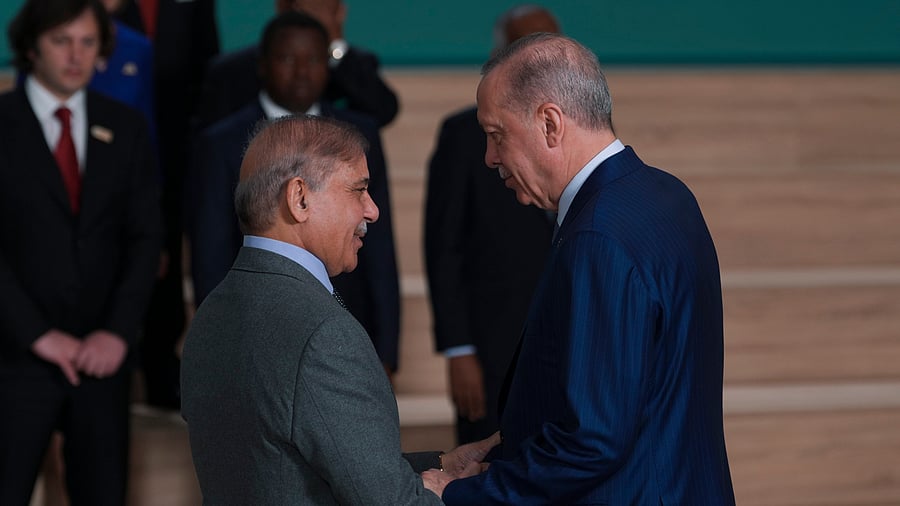
Pakistan Prime Minister Shehbaz Sharif, left, and Turkey President Recep Tayyip Erdogan
Credit: Reuters Photo
India and Pakistan on Saturday, May 10 2025, announced the ceasefire after four days of rapidly escalating drone volleys and shelling by the neighbour country on the civilian and border areas.
The four days of tensed nights saw Pakistan deploying swarm drones, including the kamikaze variant, to armed unmanned aerial vehicles (UAVs), to breach India’s airspace in a bid to cause destruction during the ongoing conflict.
The ratcheted tensions between the two countries also saw the role Turkey and its President Tayyip Erdogan played not only in supporting the neighbouring country in its actions, but also with the supply of Turkish drones, which Pakistan used to target the army installations in India.
As the tension between the countries escalated on May 7 after India hit the terror camps of Pakistan and Pakistan occupied Kashmir (PoK) with 'precision' strikes through Operation Sindoor, Turkish President Tayyip Erdogan spoke with Pakistan's Prime Minister Shehbaz Sharif to convey his solidarity.
Pakistan has strong ties with Turkey. Incidentally, Sharif was in Turkey when the Pahalgam terror attack happened on April 22.
During the call, Erdogan told Sharif that Turkey supported what he called Pakistan's "calm and restrained policies" in the crisis, a statement from his office said.
Erdogan also said he found "appropriate" Islamabad's call for an investigation into an Islamist militant attack that triggered the crisis. Turkey previously condemned India's attack and called on both sides to act with common sense. with Turkey's Foreign Ministry saying India created the risk of an "all-out war".
On the intervening night of May 8-9, the Pakistan military carried out multiple violations of Indian airspace along the entire western border with an intent to target military infrastructure, Wing Commander Vyomika Singh said at a press briefing, along with Colonel Sofiya Qureshi and Foreign Secretary Vikram Misri.
The briefing also said Pakistan launched between 300 and 400 Turkish drones across 36 locations from Leh to Sir Creek in its failed attempt to target Indian military installations on Thursday night and also accused that country of using its civilian planes as a “shield” for its aerial attacks endangering the flights.
"Forensic examination of the drone debris is being undertaken. Preliminary reports suggest them to be Asisguard Songar drone of Turkey," Wing Commander Vyomika Singh of the Indian Air Force(IAF) stated at the briefing
"Pakistan escalated with artillery and drone attacks across the Line of Control, causing casualties. Alarmingly, Pakistan kept its civil airspace open during the assault, endangering civilian flights," she said.
“Preliminary reports suggest them to be of the ASISGUARD Songar drone of Turkey. Later in the night, an armed UAV of Pakistan attempted to target Bathinda military station, which was detected and neutralised,” Wing Commander Singh had said.
Songar armed drone system, developed by ASISGUARD, can be used in any kind of day or night military and security operations. The system can broadcast real-time video and operate within a mission radius of up to 5 km, according to the website of the Ankara-based company.
A kamikaze drone is essentially an unmanned air vehicle that “carries its own warhead”, loiters over an area to locate a target, and then crashes into it, destroying both itself and the intended target, PTI reported citing a military source.
According to an Indian Express report, Pakistan Air Force (PAF) has been receiving the delivery F-16 Fighting Falcon jets from Turkish Aerospace Industries (TAI) in Ankara. Pakistan’s National Aerospace Science and Technology Park (NASTP), also entered into an agreement with Turkish drone manufacturer Baykar for research and development.
With agency inputs
